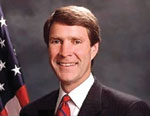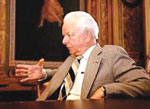OUTLOOK 2003: United States
Washington in 2003
Politicians dither around for another year
John McCaughey, Contributing Editor, Washington
A veteran Washington energy insider puts it best. “The truth of the matter,” he says, “is that nowadays (and perhaps for the last five years at least) in oil and gas, nothing of what goes on in Washington really makes much of a difference. It’s only the people in Washington who think it does. Energy reporters just transcribe what the politicians and bureaucrats tell them. But there is no value added. Either because they are too ignorant or too busy, reporters just pass on what they’re told. Mostly these are lies or half-truths.”
Yes, it is a melancholy comment, but an insightful one. In Washington energy circles, two topics predominate – politics and economics, and (more interestingly) the gray area between the two.
 |
Veteran Capitol Hill observers do not expect a banner year for oil and gas initiatives.
|
|
We turn first to the politics. The looming war with Iraq obviously dominates this scenario. The big question here is how long will the war last, and what will it do to the oil market? Some analysts foresee disaster – rising oil prices and a possible shortage of crude. More sanguine types look for an initial spike, to be followed quickly by a sharp fall in prices to perhaps $15/bbl. They reason that Saudi Arabia may raise production to force down prices and crush higher-cost competitors, especially countries like Russia.
It is to the latter line that the White House presumably hews. Declining oil prices would provide a much-needed boost to the global economy. (Editor’s note: The current President Bush campaigned on a platform that promised to help the E&P industry. However, this scenario bears a scary resemblance to the attitude of his father’s mediocre administration.)
A DIRTY LAUNDRY LIST OF FACTORS
Clearly, the war in the short term would benefit US oil and gas producers. Yet, by themselves and however well-meaning, these producers could never replace the American appetite for oil now served by imports from OPEC and elsewhere. America’s independent producers also face determined opposition from environmental groups bent upon denying them drilling access in public lands. It is on this access question that IPAA (aided to some degree by API representing the majors) is devoting much of its lobbying.
The loss of investor confidence (and consequent inability to obtain new financing) caused by the Enron debacle does not help US oil companies one bit, either. It is difficult to see just when investors will regain their previous trust in Wall Street and the market, and stop sitting on their wallets. The old conviction that financial markets will move ever higher is out the window. As one commentator put it, “Wall Street is showing less sense than the dimmest casino operator in Las Vegas. Every Vegas casino owner knows that his customers will cheerfully play the wheels and bear their losses, so long as they know the game isn’t rigged.”
WHITE HOUSE POLICY DANCE
Does the administration of George W. Bush have a master energy plan? Well, yes and no. It has a plan, all right, a.k.a. an energy bill. But for innumerable political reasons, the plan isn’t going anywhere on Capitol Hill right now. After a year-and-a-half’s debate, Congress has so far come up more or less empty-handed on this topic. The plan is something of a bouillabaisse. It is full of handouts to farmers, who grow corn for ethanol that is supposed to be a clean additive to gasoline, and to other generators of energy from clean coal to wind, sun and other renewables.
 |
At DOE headquarters, career employees seem to be giving their attention to every topic, except oil and gas.
|
|
As to details on what the Bush administration has recently done, or may do in terms of regulations in DOE or DOI, it should be pointed out that for a long time now, the Energy Department has really not been a player in energy policy. It exists to run the national laboratories (a task it does very badly) and the weapons program. Given the record, DOE should have been abolished years ago.
Oh yes, various administrations have had national energy plans (buried inside such forgettable initiatives as Richard Nixon’s Project Independence or Gerald Ford’s Whip Inflation Now or several ill-conceived programs created by Jimmy Carter). Not one of these has ever achieved a thing, except to keep a few thousand bureaucrats retired-in-place at the Forrestal Building (DOE headquarters).
As for Interior, it seems to thrive on issuing scores of Proposed Rulemakings on everything from the Lesser Spotted Warbling Thrush to federal oil valuations to pet management within California’s Golden Gate National Recreation Area (This is no joke – the advanced notice of this proposed rulemaking was just issued last month). Of course, none of that has much of anything to do with energy policy, except perhaps to deny access for drilling on public lands to IPAA members. The intricate details of this access denial (largely driven by enviros within and without DOI) is a separate story by itself.
CAPITOL HILL LOGISTICS
Not everyone is dismayed at the 107th Congress’ inability to pass energy legislation. “Thank goodness,” said veteran energy watcher Ken Maize, who has seen scores of energy plans come and go, and liked none of them. “The failure is proof-positive that gridlock is not all that bad.” Maize believes that energy legislation is even less likely in the 108th Congress than it was in the previous session.
Lee Fuller, vice president of governmental relations at IPAA, agrees. “While Republicans now control both the House and Senate, the margins are small, and managing legislation with these margins will be a challenge,” explained Fuller. “Energy issues will be a striking example.”
Fuller sees three groups managing the House, each capable of producing legislation. They include CATs, Blue Dogs and Green Republicans.
Ah, some translation is required. CATs are Conservative Action Team members, better known as the most conservative Republican representatives. Much of their attention is focused on limiting spending. “Blue Dogs” are conservative Democrats who support fiscal restraint. Several of them opposed the last energy bill. “Green Republicans” are moderates that are particularly active on environmental issues. Nevertheless, their support is vital to the Republican leadership on key votes.
 |
Sen. Pete Domenici (Republican-New Mexico) will chair his chamber’s Energy and Natural Resources Committee.
|
|
 |
As the Senate’s new majority leader, Sen. Bill Frist (Republican-Tennessee) will have much to say about any energy bills.
|
|
 |
Veteran Congressman Billy Tauzin (Republican- Louisiana) will continue to shepherd his party’s oil and gas agenda through the House Committee on Energy and Commerce.
|
|
Says Fuller, “House leadership will have to weave between these voting factions to produce an energy bill that includes the pro-producer elements essential to US production. As in the 107th Congress, the Senate will hold the key to the shape of energy legislation. Crafting a comprehensive bill in the Energy and Natural Resources Committee will test the leadership skills of Sen. Pete Domenici (Republican-New Mexico). Energy legislation will get strong attention in the 108th Congress, but industry should expect that it will have to fight through the same issues, many of which are more regional than partisan.”
Certainly, the Hill has changed politically. Sen. James Inhofe (Republican-Oklahoma) has taken control of the Senate Environment and Public Works Committee. Long an enemy of the environmental movement, he has championed his state’s oil and gas industry, and battled environmentalists. As chairman, Inhofe is expected to impose his views forcefully on the committee. Both Domenici and Inhofe will take their marching orders from the newly crowned Majority Leader, Sen. Bill Frist (Republican-Tennessee).
On the House side, Rep. Billy Tauzin (Republican-Louisiana) will continue to chair the Committee on Energy and Commerce. At the Committee on Resources, Rep. Richard Pombo (Republican-California) is taking over from Utah’s James Hansen, who retired. Policy direction will come, of course, from the new House Majority Leader, Rep. Tom DeLay (Republican-Texas).
The other imponderable in Congress this year is whether anything radical or meaningful can be done at all on energy. Congress always has the option of limping through on a series of Continuing Resolutions until the 2003 fiscal year begins in the fall.
MAKING CHOICES
Coal is America’s great resource for electricity generation, but the enviros hate it, describing coal as “dirt by wire.” Renewable sources (such as wind) are simply – upon sober examination – not viable as large-scale, generation sources.
That leaves natural gas as the best choice for electricity generation. However, this also presumes that the US has the infrastructure to deliver a lot more gas, something that regulators call a “rebuttable proposition.” In plainer language, the deliverability via pipeline for greatly increased natural gas supplies is not there, and is not likely to be there soon.
Politically, President Bush and Vice President Dick Cheney are sensitive to charges by opponents that they are far too close to the oil and gas industry. This is a somewhat absurd charge, certainly in the case of Cheney, who spent most of his professional life as a congressman and/or cabinet member. But an accusation in Washington (just like a rumor) can take on a life of its own. It is interesting that the latest budget proposals almost zero out oil and gas, and eliminate entirely any funding for research and development.
BRING ON THE PORK
Then we have the pork addiction, which eventually seems to overcome even the stoutest of legislators. As things stand here, early in the new session (and have done for a long time), there is no serious energy bill in Congress, or one with a snowball’s chance in Hell of passing. Of course, there are innumerable pieces of localized pork tucked away in various appropriations bills. But that’s just localized pork – it has nothing to do with national or global energy policy.
To list all these items would require reading the Congressional Record every day for the last year. These gifts to constituents buy senators and representatives votes at the next election, because they can claim to have provided jobs by funding (at the taxpayers’ expense) an addition to, say, the local oil refinery (which the oil company, itself, has enough financial common sense not to fund).
Admittedly, sometimes the pork is larger. ANWR (Arctic National Wildlife Refuge) or ethanol initiatives are good examples. But, neither of these went anywhere last year or are going anywhere this year. ANWR would be an excellent item, but it has scant support because nobody aside from Sen. Ted Stevens (Republican-Alaska), Sen. Lisa Murkowski (Republican-Alaska and daughter of former Alaska senator, now Gov. Frank Murkowski) or Rep. Don Young (Republican-Alaska) stands politically to benefit from it. Every other congressman or senator is loath to vote for opening ANWR, because it will enrage their local enviro constituency.
Indeed, it is quite a sport in Washington to identify pork barrel projects, which can be anything but often include energy projects (the better to sneak them in under the enviros’ radars). The Citizens Against Government Waste (CAGW) group publishes the annual “Oinkers’ Award” to recognize “dogged perseverance in the mad pursuit of pork.”
 |
As the dean of Congress, Sen. Robert Byrd (Democrat-West Virginia) knows every procedural trick to influence energy policy to his state’s advantage, including filibusters.
|
|
The most skillful practitioner is Sen. Robert Byrd (Democrat-West Virginia), who is always inserting language to fund clean coal projects in his state (a coal-rich but impoverished area) or some nonsensical DOE research project (provided that it is located in his state). Long a master of parliamentary procedure, Byrd can insert funding for projects in his state faster than a rat can climb up a drainpipe. Because such funding is relatively small in the big picture, it generally gets through the vote, unnoticed and unchallenged.
Nationally, Byrd is no fool, either. For a long time, he has opposed using scrubbers on coal plants, because it costs too much and might make coal plants uneconomic, with the consequent economic harm to his state’s main export. It’s all politics as usual for Byrd, but that’s what he’s paid for.
Sen. Byrd this year won the “Flipping the Byrd” award for sending $388 million in pork to West Virginia. He finished first with 56% of the vote, easily outdistancing his rivals. But $388 million is a drop in the appropriations ocean. CAGW reveals that the “voracious spendthrifts” in Congress porked out at a record level in fiscal 2002. They authorized 8,341 projects in 13 appropriations bills, at a record cost of $20.1 billion.
Want some more examples? Byrd’s contributions included $20.9 million for rehabilitation of a lock on a river; $9.4 million for two dam safety projects; and $7 million for a positron emission tomography facility at West Virginia University.
“It’s a feeding frenzy here on the banks of the Potomac,” said CAGW president Tom Schatz of the fiscal 2003 Omnibus Appropriations bill. And oil and gas porkies on the Hill are meeting their quotas – even if it has nothing whatsoever to do with energy policy.
On the broader front, the Senate Energy and Natural Resources Committee scheduled a hearing for early February to consider President Bush’s spending requests for the Interior and Energy Departments and the Forest Service. Nothing in this has anything to do with national energy policy, either, apart from independent producers’ problem with access to public lands.
In terms of specific legislation (not that it matters in a world of Continuing Resolutions), four pieces of legislation that were held over from last year’s House-Senate energy conference made it into the FY 2003 omnibus spending bill. That bill recently passed the Senate. The four items include reauthorization of Price-Anderson nuclear insurance; increased borrowing authority for the Bonneville Power Administration; an increase in the Low Income Home Energy Assistance Program; and permanent authorization for the President to draw from the Strategic Petroleum Reserve in times of national crisis.
ECONOMIC FACTORS
All of these politics take place against a background of the US economy, which is a good example of the half-full/half-empty glass analogy. On the one hand, the economy is growing at a moderate 2.5% to 3.0%/ year. The housing market remains strong, and interest rates are low. Indeed, short-term interest rates are even negative in real (inflation-adjusted) terms. Productivity is increasing.
On the other hand, unemployment is up to 6%, manufacturing is sluggish and corporate earnings are weak. This will make passage of the President’s $300-billion, tax-cutting, economic stimulus package an interesting subject for debate.
Even the normally breezy economic forecasters are having difficulty in finding a large enough crystal ball to guess which way the US economy will go this year. In most cases, savvy forecasters are employing the Nostradamus Technique – make your forecasts sufficiently vague and timing sufficiently fuzzy. And – if you’re lucky – something vaguely similar to your forecast might come along.
Where will it all end for energy? Economist Irwin Stelzer of the Hudson Institute had no doubts about his prescription. “So long as (officials) lurch from policy to policy,” he said, “subsidizing coal production in a failed effort to save jobs; or subsidizing nuclear, wind, sun and conservation to protect the environment; or (ssh!) subsidizing shareholders and energy hucksters; these dilemmas will remain.”
“We will have nuclear plants paying a tax for the carbon dioxide they don’t emit, consumers paying for some minister’s energy flavor-of-the-month, and resources (will be) wasted.
“Only if we allow markets to replace ministers, can a sensible, efficient energy economy emerge from the rubble of policies past and, it seems, future.” 
THE AUTHOR
|
 |
John McCaughey edits and publishes Energy Perspective, a Washington-based, fortnightly publication that features in-depth coverage of major energy topics. Mr. McCaughey has been a journalist during all his working life. He has written and edited for Irish newspapers, an international news agency, the London-based Financial Times and the U.S.-based Energy Daily newsletter, and contributed to many other newspapers. As a profession, he says, he took up journalism by accident and practices it with misgivings.
|
| |
|
|









